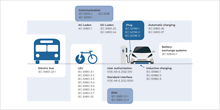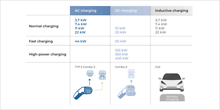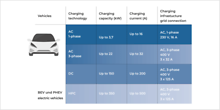Electromobility in Germany is clearly on the rise, as evidenced above all by the increasing number of new registrations of electric cars in recent years. The German government has set itself the target of seven to ten million electric cars being registered in Germany by 2030.
To drive forward the expansion of the charging infrastructure, the federal cabinet adopted the Charging Infrastructure Master Plan II in October 2022. This serves as a roadmap for the tasks of the next few years and comprises a total of 68 measures in the areas of funding, enabling local authorities, land availability, power grid integration, charging on buildings and charging of heavy commercial vehicles. The installation of charging stations in the public and private sectors as well as the expansion of the charging infrastructure are greatly facilitated by the existence of a well-developed electricity infrastructure.
A user-friendly, safe, area-wide and high-performance charging infrastructure has a significant influence on the safe and reliable charging operation of electric vehicles and is one of the basic prerequisites for greater acceptance of electromobility.










